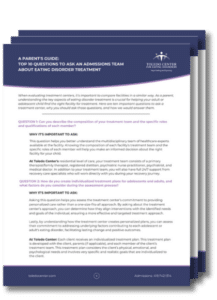PARENTS' GUIDE: Top Questions to Ask an Admissions Team About Eating Disorder Treatment
If your adult or adolescent child is suffering from an eating disorder, you know how tenuous and uncertain the journey to recovery can be. From diagnosis to initial treatment, you may experience setbacks, frustrations and questions about the quality of care your loved one is receiving. If your child is seeking residential treatment for an eating disorder, those questions are only amplified–and your role in helping your child find the right treatment facility becomes crucial.
Wherever you and your family may be in your child’s eating disorder journey, it’s important to evaluate eating disorder treatment centers using a common set of standards.
Here are ten important questions you should ask each treatment facility, why they’re important, and how Toledo Center would answer them.
QUESTION 1: Can you describe the composition of your treatment team and the specific roles and qualifications of each member?
WHY IT’S IMPORTANT TO ASK:
As your child’s treatment plan is formulated, it’s important for them to have access to healthcare experts who can address their unique needs. By asking about a facility’s healthcare team and the specific professional expertise within those teams, you’ll get a better picture of the center’s ability to meet the needs of your child.
Toledo Center’s residential level of care provides a multidisciplinary treatment team that consists of a primary therapist/family therapist, registered dietitian, psychiatric nurse practitioner, psychiatrist, and medical doctor. In addition to your child’s treatment team, they will also have full 24/7 support from recovery care specialists who will work directly with them during their recovery journey.
QUESTION 2: How do you create individualized treatment plans for adolescents and adults, and what factors do you consider during the assessment process?
WHY IT’S IMPORTANT TO ASK:
By asking this question, you and your family can better assess each facility’s commitment to personalized care over a one-size-fits-all approach. With a thorough understanding of the facility’s perspective on treatment, you can determine how they align interventions with the goals and needs of the person receiving care. This ensures a more effective and targeted treatment approach.
Additionally, by understanding how the treatment center creates personalized care plans, you can assess their ability to effectively treat the unique underlying factors of your child’s eating disorder.
At Toledo Center, each client receives an individualized treatment plan. This treatment plan is developed in partnership with the client, their parents (if applicable). and each member of their treatment team. This treatment plan considers the client’s physical, emotional, and psychological needs and identifies specific and realistic goals that are individualized to the client.
QUESTION 3: How do you approach medical stabilization for adolescents and adults, and what measures do you take to ensure their safety during this phase?
WHY IT’S IMPORTANT TO ASK:
This question helps you understand each facility’s protocols for ensuring the safety and well-being of its clients as they undergo the initial phase of treatment. It also gives you insight into a treatment center’s ability to handle acute medical issues and emergencies effectively. Asking about safety measures during the medical stabilization phase can help calm your fears and give you peace of mind as your child enters residential treatment.
At Toledo Center: In more advanced eating disorder illnesses, medical stabilization may be necessary before the client can initiate therapy. Toledo Center has an on-site nursing team that provides initial assessments and determines if any medical interventions are necessary. This involves addressing any immediate medical risks and restoring the individual’s physical health through nutrition and monitoring. Medical stabilization is an essential first step in the treatment process.
QUESTION 4: Which evidence-based therapies do you offer for adolescents and adults, and how do you determine which therapy is most suitable for each individual?
WHY IT’S IMPORTANT TO ASK:
Each facility offers different evidence-based therapy options that can meet the unique needs of a range of clients. Common therapies include cognitive-behavioral therapy (CBT), dialectical behavior therapy (DBT), and acceptance and commitment therapy (ACT). These therapies target specific behaviors, emotions, and thoughts related to the eating disorder, and it’s important to discuss your child’s unique therapy needs with each facility’s clinical staff.
Toledo Center offers a variety of evidence-based therapies, including dialectical behavior therapy (DBT), cognitive behavioral therapy (CBT), acceptance and commitment therapy (ACT), expressive therapies, and experiential therapy. While most of these modalities are used within group therapy settings, they can be applied within individual therapy as well. The treatment team of each client determines which therapies are best utilized in individual therapy when a treatment plan is developed.
QUESTION 5: How do you incorporate nutritional rehabilitation into the treatment process, and what strategies do you use to help adolescents and adults develop a positive relationship with food?
WHY IT’S IMPORTANT TO ASK:
By asking about the facility’s strategies for helping clients heal their relationships with food, you’ll get insight into how your own child’s treatment will emphasize healthier eating behaviors and attitudes. These strategies should emphasize addressing nutritional deficiencies, promoting balanced eating habits, and supporting the overall physical well-being of each client.
In the residential treatment program at Toledo Center, clients work one on one with a registered dietitian to establish a healthier relationship with food. Nutritional rehabilitation includes the development of structured meal plans, education about balanced nutrition, and participation in meal planning and preparation to address any fears or anxieties related to food.

Who We Are
Toledo Center is set in a peaceful and private setting on the banks of a picturesque 10-mile creek. Our location provides a unique, therapeutic environment that is conducive to recovery. The spacious and tranquil setting is just one example of the Toledo Center difference.
At Toledo Center, we take an innovative approach to guide clients and their families on their journeys. We use evidence-based approaches to best help each individual and understand that many people struggle with ambivalence or motivation. We provide compassionate care to help guide clients and their families through recovery. We treat all genders, ages 10 and older, helping each person reclaim their life, their health, and their future. Additionally, our child and adolescent treatment programs have a measured approach to schoolwork, dedicating time within the program without allowing this to impede the recovery process.
Looking for Treatment? As one of the top residential eating disorder treatment centers in the US, Toledo Center can help you or your loved one find the path to a better life.
© Copyright 2023 Toledo Center. All Rights Reserved. | Privacy Policy | HIPAA Policy | Accessibility Notice



